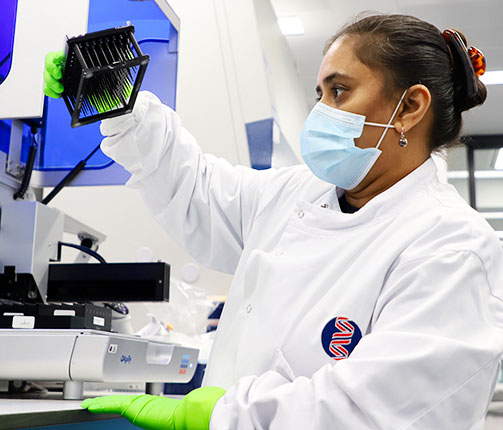 Our Haem-Oncology team is introducing rapid genetic testing to help with the treatment management of leukaemia patients.
Our Haem-Oncology team is introducing rapid genetic testing to help with the treatment management of leukaemia patients.
To help with the treatment management of patients with acute myeloid leukaemia and acute lymphoblastic leukaemia, we have introduced rapid testing for FLT3 and NPM1 gene mutations and for common translocations. Two new treatments for acute myeloid leukaemia were licenced by NICE in 2018, so it is particularly important to determine patients’ FLT3 status three days after diagnosis, to decide which drug they get.
The team have reduced this to a 48-hour turnaround, and soon, using a newly available assay in conjunction with an automated set-up and real-time PCR, this will be same-day testing.
For patients with chronic lymphocytic leukaemia, the team is working on rapid TP53/IgVH mutation testing. Patients with TP53 mutations do not respond to chemotherapy – they need targeted therapies. If this testing identifies such mutations, they qualify for ibrutinib and do not need to come to hospital to receive chemotherapy.
At present, TP53 testing is carried out as part of a next-generation sequencing panel, and IgVH mutation status is obtained using Sanger sequencing. These two tests currently have 2- and 4-week turnarounds respectively. The new test will combine the two tests together in a multiplex and will use nanopore sequencing to interrogate the TP53 gene for mutations and gross deletions and to assess IgVH mutation status. Turnaround time is anticipated to be 3 days. It will launch in Spring 2021.
The team is also exploring the use of nanopore sequencing in conjunction with existing variant and fusion panels to give full genomic data on all newly diagnosed acute leukaemia patients within 72-96 hours. This has the potential to be of enormous clinical benefit; initial exploratory work will commence shortly.
Other tests under deveiopment are the identification of KRAS/NRAS mutations and of IDH1/2 mutations by rapid PCR. It is important to identify KRAS/NRAS mutations in patients with relapsed acute lymphoblastic leukaemia, as the presence of certain KRAS/NRAS mutations opens up the possibility of MAP kinase inhibitors as a form of targeted therapy. Similarly it is also important to identify IDH1/2 mutations in patients with acute myeloid leukaemia as targeted therapy is available for patients with mutations in these genes. Rapidly identifying mutations in these genes means that treatment can potentially be given much more quickly.
For patients with a new diagnosis of B-Lymphoblastic Leukaemia, the team is working-up a new PCR-based multiplex assay that will allow the rapid detection and identification of fusion genes associated with B-ALL – including the rare ETV6-ABL1, NUP214-ABL1, RCSD1-ABL1, RCSD1-ABL2, PAD1-ABL2, SSBP2- CSF1R, SSBP2-PDGFRB, PAX5-JAK2, TERF-JAK2 and BCR-JAK2 fusions. This will help to identify patients who may benefit from tyrosine kinase inhibitors. It is anticipated that this will be available in early 2021.
| Tests |
|---|
| FLT3-ITD and FLT3-TKD screening assay |
| Leukaemia Fusion Gene Screening Assay (Q30) |
| NPM1 mutascreen assay |
| IDH1/2 screening assay NEW |
| KRAS/NRAS screening assay NEW |
